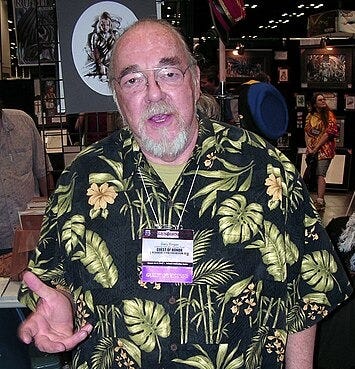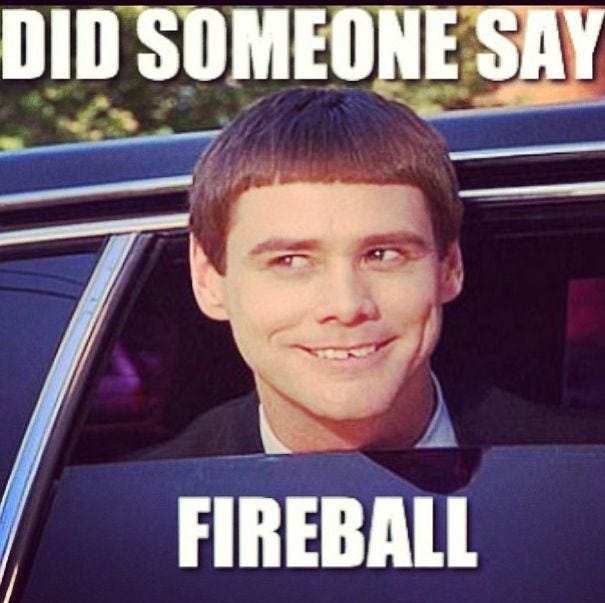Hey! I got an idea. Let’s create a new tabletop role-playing game.
I know what you’re thinking: Why?
Why, when there are thousands of roleplaying games (RPGs) out there; fantasy, sci-fi, western, cyberpunk, steampunk, horror, near-future, distant future, alternate reality, young adult, LGBTQ+, et al. Games with Crunchy rules, light rules, theatre of the mind. Why in the name of E. Gary Gygax do I feel the need to create yet another?
I suppose I’m just getting old and a little dissatisfied. And, honestly, I think I have something to add. So, here we go.
A not-so-brief background; I ‘rolled up’ my first Dungeons & Dragons (D&D) character on Thanksgiving Day 1982. I was not quite 10 years old. Hopefully, that sentence helps inform the profound effect that role-playing games (RPGs) have had on my life, the fact that I can remember the day it all started. My older brother - by fourteen years - walked me through the relatively simple character creation process. I’d heard about the game from him. He told wonderful stories about his gaming group and the crazy, fantastic things they did in the game. I’d also seen the commercials while watching Saturday morning cartoons - an ancient ritual no one under the age of 35 will remember. Check your local library for more information, kids.
That Christmas I was gifted the Dungeons & Dragons Expert Set. Not sure why Santa Claus thought I should start off with the ‘expert’ set, but I was a reasonably bright kid and since Bro seemed to know just about everything, I went with it. Before long I was reading my brother’s Advanced Dungeons & Dragons books; hardcover masterpieces with black-and-white, hand drawn pictures of wizards and warriors, horrific monsters, and you know…dragons. By this point I knew there was no turning back. My brother invited me to play in a game he was running as Dungeon Master (DM). A game filled with guys who were all about 10 years older than me. And since at the time ‘older’ meant ‘cool’, there was no effin’ way I wasn’t jumping on that opportunity.
As the years cruised by I found friends - and the occasional sketchy acquaintance - who were as much into D&D as I was. There was always someone, somewhere who was down for a game session. And what made it cooler - for white-bread geeks like me - was the fact that this all happened smack dab in the middle of the Satanic Panic; a ridiculous, media-fueled, witch hunt that portrayed playing games like D&D the equivalent of performing cat sacrifices (we just shaved them and smoked the fur, that’s all, honest) and summoning Henry Kissinger demons. A young man had killed himself allegedly because he listened to voices conjured by the game. It ballooned from there. Total nonsense, of course, but unfortunately effective. Too many parents threw out their kids’ D&D game material and started groups to combat the scourge of children reading more books, using their imagination, and freely associating with each other. The whole affair added just a dollop of danger, much like eating that last buffalo wing that’s been sitting out on the kitchen counter all night, the sauce congealed and gooey but oh…so inviting. It was kind of cool to be weird. We embraced it.
Over the years, however, D&D has changed quite a bit. And so have I. Allow me to be painfully clear at this point. I love D&D. I have great reverence for the game. It has brought so much joy, so many great stories, and so much imagination to my life. Not to mention lifelong friends. I am forever grateful that I was introduced to it as an impressionable young lad. And I’m very happy that it has found a home in the hearts of so many people - young and old - over the past several years. But after playing for forty years through five editions of the game, familiarity has definitely bred a certain amount of contempt. The ‘different but same’ aspect of each shiny new rulebook, the endless errata and fixes that inevitably pop up due to game design overreach, the eventual return to simpler rules in subsequent editions. It just gets old. Back in 2000 3rd edition was a massive power shift from 2nd edition. Consequently, 3.5 was created to fix 3rd edition. Fourth edition just sucked out loud and was - as far as I can tell - a miserable failure. So, in 2014 5th edition fixed it. The new 2024 edition (5.5 maybe?) was created to streamline, I guess, 5th edition and will eventually be revamped by a future 6th edition. And with each new edition the characters, the spells, the feats and skills…they all start to look even more similar to say the least. I assume this is in the name of ‘game balance’. In their quest to make everyone more equivalent, the new generation of game creators appear to have just made everyone the same. And that really isn’t what I’m looking for in an RPG.
The black-and-white wonder of those original AD&D books I read as a ten-year-old boy has become a vividly colorful and spectacularly drawn cut-and-paste rehash of the same old same old. The more we tinker with the rules, the more we streamline the gameplay, the less we seem to fix the real issues that make the game experience less exciting, fun, or even realistic. Nothing fundamentally changes, so much so that a game that prides itself on creativity has spawned a thousand tropes. Every new mage since 1974 is still just counting the experience points until they can cast 3rd level spells. There’s a reason there are a million “Fireball!” memes out there.
There are a few d20 games out there trying to capture the spirit of old-school D&D that also add some new mechanics. Specifically in regard to magic. Dungeon Crawl Classics (DCC) and the very popular Shadowdark make casting spells both exciting and dangerous. Instead of spells just going off because the player says so, casting requires a ‘Spell check’ roll. And failure brings consequences. Both games also make death real for the character again. Character death is less a possibility than an inevitability. I especially like DCC’s use of a ‘gauntlet’ where a small horde of 0-level characters take on a dungeon or quest and only those still alive at the end (not more than a handful) end up becoming 1st level player characters (PCs). 13th Age is another d20 variation that effectively does away with grids and 5-feet steps, perhaps my least favorite game mechanic, and makes combat and magic simpler for expedited play.
These are fine games but, to me, there’s still something missing. So, in the spirit of old-school gaming, it’s time to build a new one. It’s time to create a game system that re-captures the awe of those early years of game exploration. Before we start, though, let’s get something seriously straight. NO game will ever be perfect. No game will give us everything we’re looking for in an RPG experience. Especially since not everyone is looking for the same thing. No game will spark the excitement, the joy, the dreams of glory so many of us enjoy while offering an entirely realistic vision of combat, skill use, character development, and world mechanics. No game is perfect. But let’s see how close we can get, shall we?
My list of honorable mentions for very cool RPGs (Not d20):
GURPS (Generic Universal Roleplaying System)
As an aside, I’m currently playing in a D&D 2024 campaign. It’s a lot of fun, but it’s mostly about the company I keep there and the great game mastering. What do you think? How do you feel about the more recent editions of Dungeons & Dragons and about D&D in general? What would you like to see in a fantasy RPG? Please leave a comment or two and let us know if we’re nuts or if maybe you’ve been feeling a little something similar. Thanks!
In our next article, we’ll look at what needs to be changed and explore some ideas on how to make that happen. And yes, this means potentially sacrificing a few sacred cows.
READ Building the Perfect Role-Playing Game - Part II
Fireball meme: Pinterest
Cover art: Wikipedia Commons - LadyofHats






I really like how you thread the needle between acknowledging the joy of playing D&D and looking for something better. I'm also glad to count myself among the "friends - and the occasional sketchy acquaintance - who were as much into D&D as" you are :) A challenge I've found in my own writing is how to critique D&D while showing the "faithful" that I love the game—that we can critique things that we enjoy. I think a problem is that for those of us brought up on the game, it's hard to consider alternatives: it's just the way TRPGs "are." I'm tickled by current partisans that look down on D&D players because *they* play Pathfinder. Y'all realize it's the same game, right?
I'm interested to see where your thoughts about a new RPG take you. I've enjoyed playing Cypher and seeing how its designers have tried to create something different. If I have any complaint, though, is that there aren't enough options in its action economy—even pretty advanced characters have like three or four things they can really "do." While D&D's spell system certainly has its drawback, what makes it enjoyable is that it's a catalog of ways to affect the game world. The same goes for the various combinations of features (now) derived from background, class, feats, and species. Together they provide a lot of options and ways of channeling the player's agency—which is what games are all about.
Two books I'd recommend: C. Thi Nguyen's _Games, Agency as Art _ and, since you talk about the Satanic Panic, Joseph Laycock's _Dangerous Games_. I think you'd like his work in general. he writes about relgious subcultures and other communities at the intersection of religion and imagination: people who think they're vampires, religious visionaries, and the Satanic Temple.
Add a link to part 2 at the end!